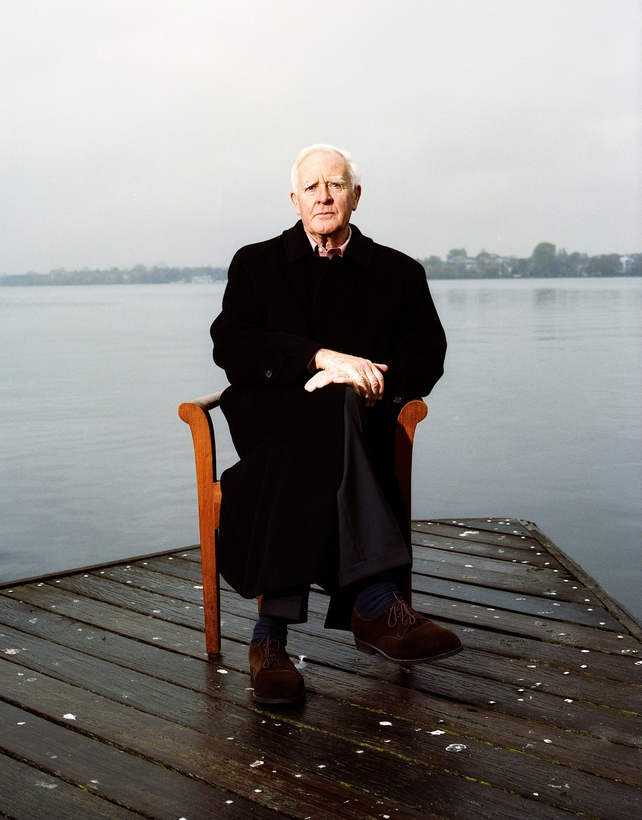There are signals from the start of John le Carré’s new novel, Agent Running in the Field, that we are in for a comedy. The words “no collusion” appear on the first page, and the opening scene amounts to a protracted attempt by two characters to set up a badminton match. With Trump and Brexit looming over the proceedings, the novelist would be hard put to exclude a comic element. But one of the ironies of the moment we’ve been living through since 2016 is that no matter how clownishly the leaders of the U.S. and the U.K. have behaved, their opponents among the citizenry and their servants in the intelligence community have remained dead serious. It’s a dynamic that lends itself to a higher form of farce, not unlike competitive badminton.
Across 25 novels and nearly six decades, le Carré—real name David Cornwell, veteran of M.I.5 and M.I.6, forced into an early retirement from espionage by his pseudonymous success—has been the laureate Anglophone dramatist of human intelligence (HUMINT), the stuff agents get from informants, moles, and defectors, as opposed to signals intelligence (SIGINT), gathered from wiretaps and other tapped communications. In his earliest novels—see Call for the Dead (1961) and The Spy Who Came in from the Cold (1963)—he weaved pure double-cross and double-double-cross plots across the matrix of East-West Cold War antagonism. Taking up the story of Kim Philby and the Cambridge Five in Tinker, Tailor, Soldier, Spy (1974), he proved his method adaptable to headline-worthy topicality. In fact, the novels became psychologically richer as they flirted with front-page news. In the post–Cold War era, he moved on to the secret byways of arms smuggling (The Night Manager, 1993), Big Pharma (The Constant Gardener, 2001), international terrorism (A Most Wanted Man, 2008), and so on. All along—and in contrast to spy novelists like Ian Fleming, Robert Ludlum, and Richard Condon—le Carré has been little concerned with glamorous men of mystery and the violent situations that constantly befall them and the femmes fatales that land in their beds. (Well, there are a few such femmes.) His true subjects are institutional rot, dual loyalties, and the unintended consequences of good intentions. Despite its title, Agent Running in the Field is a novel mostly about office politics.

Le Carré, who turned 88 this week, may have outlived not only the political conflict that fueled his early work but the salience of human intelligence itself. In his memoir, Permanent Record, Edward Snowden tells a story that could have come out of a le Carré novel: stationed in Geneva to do I.T. work for the C.I.A., he meets a Saudi banker who might be of use to his colleagues looking into terrorist financing. A fellow spy gets the man drunk and calls the Swiss police on him as he drives home. A classic “burn,” in le Carré jargon. But instead of becoming dependent on his new American friends, the banker goes home to Saudi Arabia. Human intelligence, Snowden learns, is a messy art that leads to a lot of useless waste, not to mention false information. (Where, at this late date, is that pee tape described in the Steele dossier?) People are boastful, dishonest, and often simply deluded or wrong. SIGINT, Snowden’s domain, doesn’t lie (unless it’s a decoy), and it’s the horizon of the vast majority of all current and future intelligence-gathering operations.
I bring Snowden up because his name sounds suspiciously similar to one of the badminton players we meet at the start of Agent Running in the Field. He is Ed Shannon, a twentysomething researcher for a media organization, looking to challenge the badminton champion of the Athleticus Club in Battersea. Nat, said champ and our narrator, is nearly 47 years old and recently returned to London from the Baltics, where under diplomatic cover he ran agents for the British foreign-intelligence service. Like many a le Carré character, Nat is in peril of being put on the shelf, having aged out of his prime years of usefulness. Overtaken by new technologies, new political paradigms, and rival careerists, he’s put in charge of a minor London intelligence post called the Haven, setting up Russia-oriented ops on home turf and handling double agents. Like Snowden, Ed is a vehement idealist, a digital-native millennial, and secretly a technical worker in the intelligence services. There the similarities between the fictional whistle-blower and the real-life dissident end. Snowden’s bugbear is online surveillance, and he carried out his leaks with meticulous care; Shannon’s obsessions are Brexit and Trump, topics he rants about regularly over post-match pints at the club with Nat. He has an affinity for Germany, and a stint living there has made him a radical Remainer.
Le Carré may have outlived not only the political conflict that fueled his early work but the salience of human intelligence itself.
I’m not of the opinion that spoilers matter much when it comes to le Carré—it’s obvious from the start of Tinker, Tailor, Soldier, Spy that Bill Haydon is Moscow’s mole in the Circus—because the pleasure in his novels come in the unwinding, the elegant doling out of detail, the lingo and mores of le Carré’s self-referential spook universe. The first half of Agent Running in the Field is loaded with backstories and false flags, the most intriguing of which is a stealth operation to bug a Ukrainian oligarch with the help of his mistress. Its true plot commences when Shannon emerges in the crosshairs of an operation Nat has authored. He is a willing leaker of state secrets but also a dupe of foreign spies. (In his memoir, Snowden claims that he accepted Russian asylum but turned down an offer to work with Russian intelligence.) The plot lacks nothing in intricacy, but the bombshell conspiracy Ed reveals turns out to be a dud.
It would be a stretch to say that a few of the characters in Agent Running in the Field could have walked into it from the pages of a Sally Rooney novel, but le Carré does seem interested in and sympathetic to the millennial generation. Along with Ed Shannon, there is Steff, Nat’s liberal feminist daughter, and Florence, his Haven colleague who grows weary of the lying their trade requires. Like young people in any era, le Carré implies, they are full of zeal and plenty stubborn about it. Le Carré has been a master chronicler of espionage for three generations because of his political negative capability: though he’s hardly a both-sider, he can inhabit opposing political stances and sensibilities, even within the same character. It remains to be seen whether Ed Shannon’s generation will produce a chronicler of the new world of espionage via bulk-collection practices and the human vacuum of metadata as sly and resourceful as the reigning master.
Christian Lorentzen is a writer who lives in Brooklyn


